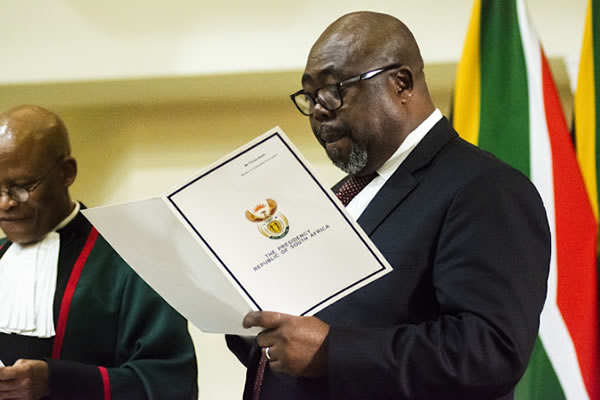Employment & labour minister Thulas Nxesi has launched a scathing attack on employers who hire foreigners instead of South Africans in low-skilled jobs, warning that the government would impose harsh penalties to curb the practice.
Speaking to Business Times on the sidelines of the 27th Nedlac summit in Johannesburg on Friday, the minister launched a scathing attack on employers that overlook South Africans for low-skilled jobs.
He specifically lambasted the security industry and hospitality and agriculture sectors for employing large numbers of foreign nationals in jobs that can be done by locals, a practice he vowed the government would come down on hard.
“We have to be harsh on employers who employ these people. One of the things I want to propose is hard punitive measures for the employers who employ foreign labour when you have local labour, especially at a low-skilled level. They are the ones who are creating this problem,” he said.
Businesses guilty of this practice must be fined a percentage of their turnover because current fines for this weren’t adequate, Nxesi added.
“We catch some of them and take them through the legal process but they are given a slap on the wrist. If you have a farmer that makes R10m a year and he gets a fine of R500 and a warning to say do not do it again, what is that? We must look at the legislation. The fine must be a percentage of the turnover or profit, we must go very hard.”
Nxesi said the government must respond, especially in light of the high unemployment in the country.
“What special skills do you need to work on a farm? What special skills do you need to work as a domestic worker and what special skills do you need to work in the hospitality industry, like a restaurant where you service people? In most of these restaurants it is rare that you find South Africans. For 20 staff members you find that only five are South Africans.”
Nxesi accused some employers of exploitation as foreign workers were a cheap labour source willing to work for a fraction of the money demanded by South Africans.
“It’s not because they love them but because they are interested in cheap labour. They know those people are desperate and will take anything. If the rate is R50, for example, they are ready to pay R5. That displaces South African workers and that is what the fight is all about. It is about the poor fighting among themselves over the scarce resources caused by the employers,” he said.
The Employment Services Amendment Bill, which aims to tackle the high representation of foreign nationals in lower occupation levels, was at an advanced stage and would soon be presented to parliament, he sad.
“Our document is at a stage where there were comments and we are consolidating those comments together with the amendments that we have put in. Once we finish that, I suspect by October or November, we will be throwing it in parliament. We have had almost 6,000 comments and we must take each and every comment into consideration or other people will hold us to account,” Nxesi said in reference to anticipated legal challenges to the proposed law.
“Already there were human rights lawyers who were saying when are we going to publish this [bill] because they want to take [us] to the Constitutional Court”.
Enacting laws that protected South Africans was not xenophobic, since other African countries had legislation that put their citizens first, Nxesi said.
“You go to Zimbabwe; what did that government say through the president? It said no foreigner will be employed if a Zimbabwean has a skill. They are very clear about it. Same with Namibia, same with Botswana, same with Ghana, same with Nigeria. You have a responsibility to your own citizens without violating the rights of others.”
The government was also partly to blame for not properly securing the country’s borders and ensuring that people who arrived in SA were documented and had scarce skills required by the economy, he said.
“We have made our country a free for all and as a result people can do anything. It cannot be like that. We are a sovereign country with borders. Even the most advanced countries, countries of the EU, where there is a lot of trade, they have borders, you have to show your passport as you go in and out. It does not suggest that we become borderless states,” Nxesi said.
Wendy Alberts, CEO of the Restaurant Association of SA, said the minister cannot raise such concerns without providing statistics.
“He cannot make an assumption that every industry has a bunch of foreign nationals. He must go to the department of home affairs and get proper details,” Alberts said.
Anti-foreigner sentiment has been on the rise in SA, fuelled by movements such as Operation Dudula, which have demanded that foreigners not be prioritised for jobs.
Dudula members have even barred foreign nationals from being helped at public health-care facilities.
Attempts by the department of home affairs to scrap permits that allow undocumented Zimbabweans to remain in the county are now facing a legal challenge.
Home affairs minister Aaron Motsoaledi recently announced a further six-month extension of the grace period for 178,000 Zimbabwean exemption permit (ZEP) holders to regularise their status. But the Helen Suzman Foundation has vowed to continue with court action challenging this.
Business Unity SA CEO Cas Coovadia told the Nedlac summit that SA presented a poor investment climate for both domestic and foreign investors.
“Recently I saw a report on the top 20 countries in Africa from a growth point of view, and South Africa isn’t in the top 20 in Africa and that should worry us greatly.
“We are not achieving the levels of growth we need … because we are not attracting the sort of investments we ought to… and we are not creating the sort of environment we need … though we are talking about it,” Coovadia said.

Follow Us on Twitter











